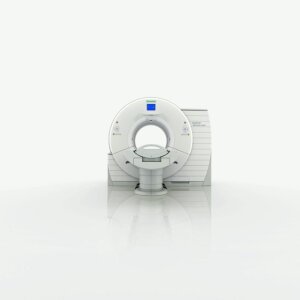by
Brendon Nafziger, DOTmed News Associate Editor | August 26, 2011

Siemens' Somatom Flash
(Credit: Siemens)
A new breed of "flash" 128-slice CT scans could allow doctors to image a heart in a single heartbeat, using less radiation than earlier models and stacking up well against cardiac MRI.
In the small study, published in the journal Circulation: Cardiovascular Imaging this week, the second-generation 128-slice, dual-source "flash" CT was nearly as accurate as cardiac MRI in detecting blood-flow problems to the heart.
For certain at-risk populations, the researchers said low-radiation-dose CT scans might be preferable to MRI scans because they can provide both anatomical information about the arteries and functional information about blood flow at the same time.



Ad Statistics
Times Displayed: 172682
Times Visited: 3120 For those who need to move fast and expand clinical capabilities -- and would love new equipment -- the uCT 550 Advance offers a new fully configured 80-slice CT in up to 2 weeks with routine maintenance and parts and Software Upgrades for Life™ included.
For the trial, the researchers used a two-part protocol, which included stress CT scans, which show blood flow to the heart after the injection of a drug, and CT angiography, which reveals narrowing of the arteries.
The work was led by Dr. Gudrun M. Feuchtner of the radiology department of Innsbruck Medical University in Austria.
The researchers said the newer scanner they used, the Somatom Definition Flash, made by Siemens Healthcare, uses a high-pitch mode for ultrafast scans of the heart, which take around 0.4 seconds. Previously, most CT scans would take about six seconds (and therefore multiple beats) before they could image a heart.
The faster speed means the new model delivers about six times less radiation than "first generation" 64-slice devices.
In the study, the average dose for the two-part CT scans was a relatively low 2.5 mSv, equivalent to roughly 25 chest X-rays. Earlier scanners had a typical dose of 12 mSv, the researchers said.
The Somatom Flash has only recently hit the market, with the
first U.S. installation in April 2009, at the Mayo Clinic in Rochester, Minn. Around 68 scanners have been installed in the United States so far, a Siemens representative told DOTmed News.
In the study, 39 patients underwent CT stress tests. Of these, 30 also had heart MRI scans (with a 1.5-T Philips Achieva). Another 25 had invasive angiographies.
Compared with stress MR, stress CT scans had between 78 and 96 percent sensitivity, and between 87 percent and 88 percent specificity.
And matched against invasive angiography, CT scans had 96 percent sensitivity, and 88 percent specificity, in revealing narrowing of the arteries (more than 70 percent stenosis). The overall accuracy jumped from 84 to 95 percent after adding CT perfusion tests to the results, the researchers said.
However, the researchers did acknowledge some limitations: there was, for instance, high coronary artery disease prevalence in the study group, which could have influenced the accuracy of the results. Also, many patients had to be disqualified because of kidney problems. The researchers recommend follow-up studies on groups at lower risk for the disease.
Back to HCB News

